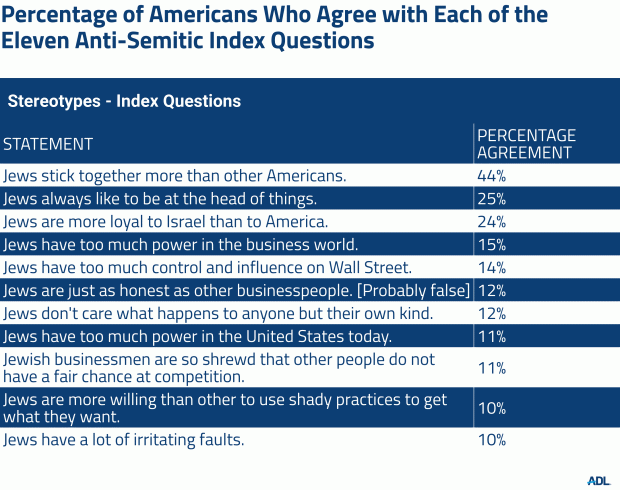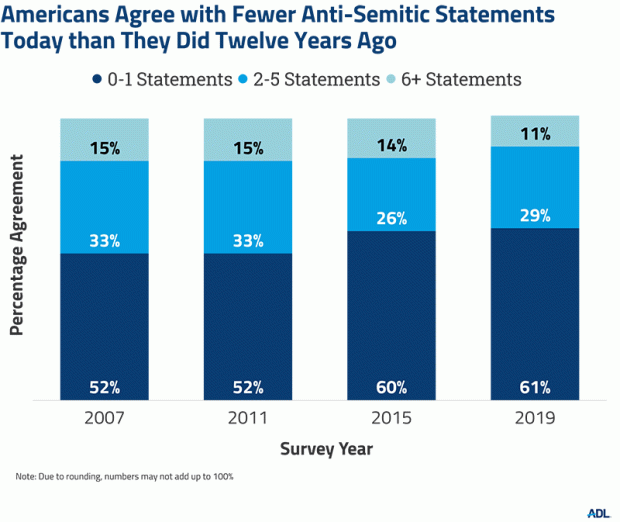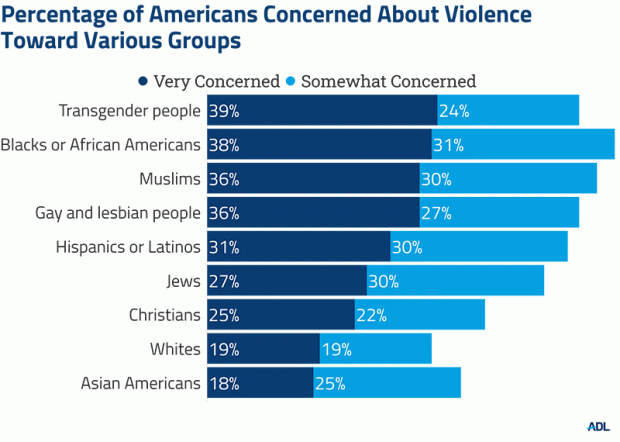
Introduction
At a terribly disturbing time for American Jews, marked by the greatest anti-Semitic violence and incidents experienced by the community in decades, ADL (the Anti-Defamation League), has completed its latest survey of American attitudes toward Jews.
The topline results reveal some positive news, while also demonstrating the pervasive persistence of anti-Semitic tropes in our society. On the bright side, a relatively low share of Americans harbors significant anti-Semitic attitudes, a finding in line with ADL’s previous surveys over the past 20 years. However, that share still represents tens of millions of people harboring virulent views. Also, of deep concern is the widespread belief among Americans in one or more anti-Semitic stereotypes.
Conspiratorial beliefs and tropes related to Jews have fueled violence against Jews for nearly two thousand years and continue to be implicated in the more recent attacks on the Jewish community. The man accused of wounding four people with a machete at a Hanukkah party in Monsey, NY had searched the internet for “prominent companies founded by Jews.” Among the reasons that the Poway synagogue shooter cited for attacking Jews was allegedly their “using usury and banks to enslave nations in debt and control all finances for the purpose of funding evil.”
Since 1964, ADL has taken the pulse of anti-Semitic attitudes in America. Our latest Survey of American Attitudes Toward Jews finds that a majority of Americans agree with at least one common stereotype about Jews; and approximately one-in-four Americans believe in the historical myth that Jews killed Christ. Nefarious myths about Jewish control of government have more recently been used by white nationalists to espouse a new belief that Jews are weakening American culture by supporting immigration – a belief that is also held by one-in-ten Americans.
In the original 1964 poll, ADL found that 29 percent of Americans believed in six or more common stereotypes about Jews, out of a total of 11 such stereotypes that they were asked about. That percentage has declined significantly over the ensuing 55 years, and, indeed, has stayed relatively flat at the lower end over the past two decades. The new survey finds that 11 percent of American adults believed in six or more of the 11 stereotypes tested. While the decline over the past 55 years should be celebrated, the current share still translates to more than 28 million Americans. In recent years there has been a surge of anti-Semitic incidents, including violent crimes, even as overall anti-Semitic attitudes remain low. It is a stark reminder that it only takes a small number committing violence to create an epidemic. Society must redouble its efforts to fight anti-Semitism and all forms of hate in order to reverse the recent uptick in anti-Semitic incidents and violence.
Methodology
Since the 1964 poll, ADL has conducted a nationally representative survey that asks Americans a series of questions on their attitudes toward Jews and their belief in common anti-Semitic tropes. In 2019, ADL commissioned First International Resources and Anzalone Liszt Grove Research to assess attitudes and opinions toward Jewish people in the United States.
The survey was conducted between October 12 and 16, 2019 and included 800 interviews. All interviews were conducted among U.S. citizens age 18 and over. The expected margin of sampling error is +/- 3.5 with a 95 percent level of confidence. Interviews were conducted via landline telephones and cellphones. All telephone respondents were selected by simple random sampling from comprehensive telephone number databases.
The data were weighted to be reflective of the national population on a number of demographic measures, including age, gender, religion, education, race, ethnicity, and geographic region.
Stereotypes about Jews
Since 1964, ADL has asked 11 questions about classic stereotypes about Jews. The 11-question index of anti-Semitic propensities was created by ADL and scholars at the University of California, Berkeley, and since then has served as a benchmark for measuring anti-Jewish attitudes in America.
As indicated in the table below, many Americans agree with common tropes about Jews. (These numbers should be seen as conservative since many respondents may be reluctant to voice agreement). The most agreed-upon statements tap into nefarious beliefs about Jewish clannishness and power: 44 percent of respondents agreed with the statement that “Jews stick together more than other Americans,” 25 percent agreed that “Jews always like to be at the head of things” and 24 percent believed that “Jews are more loyal to Israel than to America.”
One way to look at individuals’ responses is to calculate the percentage of people who agree with various quantities of these statements. In our current survey, 11 percent of Americans agreed with six or more of the most common anti-Semitic stereotypes, as compared to 14 percent of Americans in the last ADL poll conducted in 2016. It should be noted, however, that the difference in percentages found is statistically within the margin of error. While a small minority of Americans agreed with six or more statements, many more endorsed a lesser number of anti-Semitic beliefs. Well over half of those polled (61 percent) agreed with at least one of the anti-Semitic statements asked and more than one-third (39 percent) agreed with at least two statements.
Anti-Semitic Attitudes Over Time
The following chart shows the percentage of American adults who agreed with six or more stereotypes since ADL began the survey. After a significant drop during the second half of the 20th century, this figure has remained relatively constant.
Percentage of Americans Who Agreed with Six or More Statements
In addition to the 11 statements, ADL asked about other old and new Jewish stereotypes. Approximately one-in-four (27 percent) people responded that they believe the historical myth of “deicide” -- the notion that “Jews killed Christ.” We also asked whether people believe that Jews are responsible for an increase in U.S. immigration, a myth that has gained traction in white supremacist circles. We found that 10 percent of respondents agreed with the statement that “Jews want to weaken our national culture by supporting more immigrants coming to our country.” Other stereotypes tested were that “Jewish employers go out of their way to hire other Jews” (31 percent agreement); “the movie and television industries are pretty much run by Jews” (17 percent agreement); and “Jews still talk too much about what happened to them in the Holocaust” (19 percent agreement).
On the other hand, many respondents have positive associations about Jews. In particular, 79 percent of Americans believe that “Jews place a strong emphasis on the importance of family life” and 66 percent believe that “Jews have contributed much to the cultural life of America.”
Attitudes about Jews Compared to Other Groups
In order to assess how Americans viewed Jews compared to how they view other groups, we asked individuals to rate their warmth toward a number of groups on a scale from 0 (coldest and most negative) to 100 (warmest and most positive). This is a common method for assessing explicit attitudes of group members in the social sciences.[1]
The results for Jews are comparable to many other groups, including “Whites” and “Blacks or African Americans.” In contrast, Americans have far colder views toward Muslims and gay men, lesbians and transgender individuals.
[1] Alwin, Duane (1997). "Feeling Thermometers Versus 7-Point Scales." Sociological Methods & Research 3(25): 318-340
Anti-Israel Attitudes
As recognized by the International Holocaust Remembrance Alliance, some expressions of anti-Israel sentiment can cross the line into anti-Semitism, potentially affording a more “socially acceptable” way of communicating anti-Semitism. Examples of this include denying Jews the right to self-determination by claiming that Israel’s existence is a racist endeavor or comparing Israeli policies to those of the Nazis. As a result, we asked questions that sought to differentiate between legitimate criticisms of Israel and criticisms that may be anti-Semitic.
We found that roughly one-in-six polled (16 percent) agreed with the statement that Israel’s record on human rights “is worse than most other countries” and around one-in-seven (14 percent) agreed with the statement that the Israeli government “sometimes behaves as badly as the Nazis.” Seven percent of Americans said that American Jews are responsible for Israel’s actions, and 8 percent expressed support for boycotting Israeli products and companies.
Perceptions of Violence Against Jews and Other Groups
We also asked about perceptions about hatred and violence against different groups. Many Americans are concerned about violence against vulnerable populations, which is not surprising given the high number of recent hate crimes. Fifty-seven percent of Americans are “somewhat” or “very concerned” about violence against Jews - placing Jews in the middle of the groups we asked about. Note that our survey was fielded before the most recent wave of anti-Semitic attacks.
Conclusion
A significant share of Americans still subscribes to harmful stereotypes about Jews. While this percentage is lower than half a century ago, the share still corresponds to over 28 million American adults. The recent uptick in anti-Semitic incidents suggests that more of these individuals may be willing to act on their anti-Semitic animus. As long as these stereotypes persist in society, they create a pool of individuals who may be emboldened to act out on their hatred.
Policy Recommendations
The following are measures that, taken together, can signal that acting on anti-Semitic attitudes will not be tolerated and help combat the rise in anti-Semitic incidents. We call on Congress to pass the following:
- Domestic Terrorism Prevention Act (H.R. 5602/S. 3190) to enhance federal efforts to prevent domestic terrorism by requiring federal law enforcement agencies to regularly assess threats and to provide training and resources to assist state, local, and tribal law enforcement efforts;
- National Opposition to Hate, Assault, and Threats to Equality (“NO HATE”) Act (H.R. 3545/S. 2043) to incentivize hate crime reporting, grants for state-run hate crime hotlines and additional sentencing options for individuals convicted under the federal Matthew Shephard and James Byrd, Jr. Hate Crimes Prevention Act;
- Never Again Education Act (H.R. 943/S.2085) to establish a fund to provide teachers the resources necessary to teach the important lessons of the Holocaust;
- Stop Hateful and Abusive Telecommunications Expression (“Stop HATE”) Act (H.R. 1934/S.917) to direct the Assistant Secretary of Commerce for Communications and Information to prepare and submit periodic reports to Congress on the role of telecommunications in hate crimes;
- Special Envoy to Combat and Monitor Anti-Semitism Act (H.R. 221/S. 238) which would elevate and strengthen the role of the State Department’s Anti-Semitism Envoy;
- Legislation to hold perpetrators of online hate accountable, along the lines of the Online Safety Modernization Act introduced in the 115th Congress;
- Fully fund the non-profit security grants to protect at-risk institutions and meet the needs of all faith groups and their places of worship, schools, and community centers;
- Fund federal programs that support hate crimes investigations and prosecutions by state, local and tribal law enforcement officials; and
- Increased funding for inclusive school anti-bias education, civics education, and bullying prevention programs.














